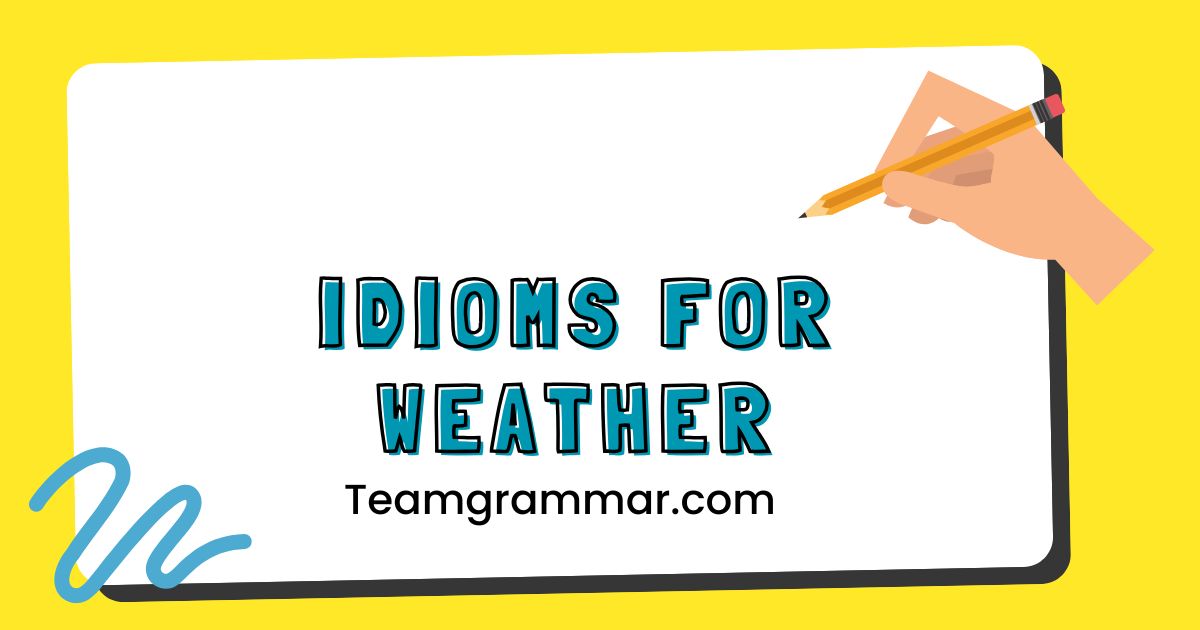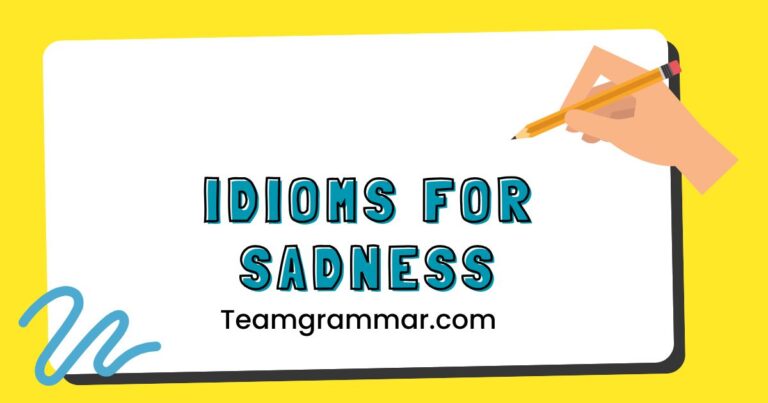45 Weather Idioms: Mastering Figurative Language
Understanding idioms is crucial for mastering the nuances of the English language. Weather idioms, in particular, add color and depth to our conversations and writing by using meteorological phenomena to describe various situations, emotions, and behaviors.
This article explores the fascinating world of weather idioms, providing comprehensive explanations, examples, and practice exercises to help learners of all levels grasp their meanings and usage. Whether you’re an ESL student, a writer seeking to enrich your prose, or simply someone curious about the English language, this guide will equip you with the knowledge and skills to confidently use weather idioms in your daily communication.
Table of Contents
- Introduction
- Definition of Weather Idioms
- Structural Breakdown of Weather Idioms
- Types and Categories of Weather Idioms
- Examples of Weather Idioms
- Usage Rules for Weather Idioms
- Common Mistakes with Weather Idioms
- Practice Exercises
- Advanced Topics in Weather Idioms
- Frequently Asked Questions
- Conclusion
Definition of Weather Idioms
Weather idioms are figurative expressions that use elements of weather, such as rain, sunshine, wind, and storms, to convey meanings beyond their literal definitions. These idioms function as a type ofmetaphor, drawing parallels between weather phenomena and human experiences, emotions, or situations.
They are deeply embedded in the English language and are used to add vividness and emotional impact to communication. Understanding weather idioms is essential for achieving a high level of fluency and comprehension in English.
Idioms, in general, are phrases or expressions whose meanings cannot be understood from the ordinary meanings of the words that comprise them. Weather idioms specifically leverage our shared understanding of weather patterns and their associated feelings to create a relatable and expressive form of communication.
For instance, saying someone is “under the weather” doesn’t literally mean they are standing outside during a storm; it means they are feeling unwell.
The classification of weather idioms falls under the broader category offigurative language, which also includes similes, metaphors, and personification. Their function is primarily stylistic, adding color, emphasis, and emotional resonance to speech and writing.
The contexts in which weather idioms are used are incredibly diverse, ranging from informal conversations to formal literary works. They can be found in everyday speech, news articles, novels, and poetry, illustrating their pervasive influence on the English language.
Structural Breakdown of Weather Idioms
Weather idioms, like all idioms, arefixed expressions, meaning that their structure and wording are generally inflexible. Altering the words or their order can often change the meaning or render the idiom nonsensical.
Understanding the structural components and patterns of these idioms can aid in their recognition and correct usage.
Most weather idioms consist of a combination of nouns, verbs, adjectives, and prepositions arranged in a specific order. The weather element (e.g., rain, sun, wind) typically acts as a noun, while the verb often describes an action related to that element or the effect it has.
Adjectives can further modify the weather element, adding nuance to the idiom’s meaning. Prepositions often connect the weather element to other parts of the sentence, establishing relationships and context.
For example, in the idiom “a storm in a teacup,” the structure is as follows: “storm” (noun), “in” (preposition), “a teacup” (noun phrase). This structure conveys the meaning of a trivial matter being blown out of proportion.
Similarly, in “chasing rainbows,” “chasing” (verb) acts upon “rainbows” (noun), indicating the pursuit of something unattainable or unrealistic. Recognizing these structural patterns helps learners to identify and understand new weather idioms as they encounter them.
Some weather idioms are also based onmetaphorical comparisons. For instance, “smooth sailing” compares a journey on calm waters to a task or project progressing without difficulties.
The structure here relies on the implied similarity between the ease of sailing on smooth waters and the effortless completion of a task. This type of structural understanding enhances the ability to interpret and use weather idioms effectively.
Types and Categories of Weather Idioms
Weather idioms can be categorized based on the types of situations, emotions, or concepts they describe. This categorization provides a framework for understanding and remembering these expressions.
Here are some common categories:
Idioms Describing Moods and Emotions
These idioms use weather elements to depict various emotional states, ranging from happiness and contentment to sadness and anger. They provide a vivid and relatable way to express feelings.
Idioms Describing Difficult Situations
This category includes idioms that use weather metaphors to describe challenging or problematic circumstances. They often convey the idea of facing adversity or dealing with obstacles.
Idioms Describing Uncertainty or Change
These idioms employ weather imagery to express situations that are unpredictable, unstable, or undergoing transformation. They often highlight the lack of clarity or the potential for unexpected events.
Idioms Describing Success or Failure
This category encompasses idioms that use weather metaphors to describe outcomes, achievements, or setbacks. They often convey the idea of favorable or unfavorable results.
Examples of Weather Idioms
The following sections provide extensive examples of weather idioms, organized by category. Each example is accompanied by a definition and a sample sentence to illustrate its usage.
Examples Describing Moods and Emotions
The table below provides examples of weather idioms used to describe moods and emotions, along with their definitions and sample sentences.
| Idiom | Definition | Example Sentence |
|---|---|---|
| Under the weather | Feeling unwell or slightly ill | I’m feeling a bit under the weather today, so I’m going to stay home. |
| On cloud nine | Extremely happy or elated | She was on cloud nine after receiving the job offer. |
| A face like thunder | Looking very angry or displeased | He had a face like thunder when he found out about the broken vase. |
| A ray of sunshine | A person who brings joy and happiness | Her cheerful attitude is always a ray of sunshine in the office. |
| To rain on someone’s parade | To spoil someone’s enjoyment or plans | I don’t want to rain on your parade, but I think you should reconsider that idea. |
| Walking on sunshine | Feeling extremely happy and positive | Ever since she met him, she’s been walking on sunshine. |
| In a fog | Confused or disoriented | I’ve been in a fog all day; I can’t seem to focus. |
| Cloudy with a chance of meatballs | Used to describe a bizarre or unpredictable situation, often humorous | The project meeting was cloudy with a chance of meatballs – nothing made sense. |
| Stormy relationship | A relationship characterized by frequent arguments and disagreements. | They have a stormy relationship, always fighting and making up. |
| Clear skies ahead | A situation where there are no apparent problems or obstacles. | With the funding secured, it’s clear skies ahead for the project. |
| Every cloud has a silver lining | There is something good even in a bad situation. | Even though he lost his job, he believes every cloud has a silver lining. |
| Calm before the storm | A quiet period before a period of intense activity or trouble. | The silence in the office was the calm before the storm, as everyone knew layoffs were coming. |
| As right as rain | Feeling completely well or in good condition. | After a good night’s sleep, I’m as right as rain. |
| Chasing rainbows | Pursuing unrealistic or unattainable goals. | He’s always chasing rainbows, never satisfied with what he has. |
| When it rains, it pours | When bad things happen, they tend to happen all at once. | First I lost my keys, then I got a flat tire; when it rains, it pours. |
| Come rain or shine | No matter what happens; regardless of the circumstances. | Come rain or shine, I’ll be there for you. |
| Fair-weather friend | Someone who is only a friend in good times. | He turned out to be a fair-weather friend, disappearing when I needed help. |
| Get wind of something | To hear a rumor or piece of information. | I got wind of the company’s plans to merge with another firm. |
| Make hay while the sun shines | To take advantage of a favorable situation. | We should make hay while the sun shines and finish the project while we have the resources. |
| Weather the storm | To survive a difficult period. | The company managed to weather the storm of the recession. |
Examples Describing Difficult Situations
The table below provides examples of weather idioms used to describe difficult situations, along with their definitions and sample sentences.
| Idiom | Definition | Example Sentence |
|---|---|---|
| In deep water | In a difficult or dangerous situation | The company is in deep water after the scandal broke. |
| A storm in a teacup | A trivial matter that is blown out of proportion | The argument was just a storm in a teacup; everyone calmed down eventually. |
| Between a rock and a hard place | Facing a difficult choice between two equally unpleasant options | I was between a rock and a hard place: either lose my job or compromise my ethics. |
| To be snowed under | To be overwhelmed with work or tasks | I’m completely snowed under with paperwork this week. |
| To pour oil on troubled waters | To try to calm a situation or argument | He tried to pour oil on troubled waters by suggesting a compromise. |
| Raining cats and dogs | Raining very heavily | It’s raining cats and dogs outside; I hope you brought an umbrella. |
| A cold snap | A sudden period of cold weather | The unexpected cold snap damaged the crops. |
| Gone to ground | To disappear or go into hiding, often to avoid trouble | After the accusations, he seemed to have gone to ground. |
| High and dry | Left in a helpless or abandoned situation | When the company went bankrupt, many employees were left high and dry. |
| Run out of steam | To lose energy or enthusiasm | The project ran out of steam due to lack of funding. |
| Take a rain check | Postpone a plan | I’ll have to take a rain check on that dinner, I’m too busy tonight. |
| Thick as fog | Very dense or difficult to see through. | The mystery surrounding his disappearance is thick as fog. |
| Turn up the heat | To increase pressure or intensity. | The police decided to turn up the heat on the investigation. |
| Up a creek without a paddle | In a difficult situation with no way out. | If we miss the deadline, we’ll be up a creek without a paddle. |
| Walking on thin ice | In a risky or dangerous situation. | He’s walking on thin ice after his recent mistakes. |
| A bolt from the blue | Something unexpected and shocking. | The resignation came as a bolt from the blue. |
| In the eye of the storm | In the center of a turbulent situation, often calm while chaos surrounds. | As the manager, she had to remain calm, even though she was in the eye of the storm. |
| A perfect storm | A combination of factors that create a particularly bad situation. | The economic crisis was a perfect storm of bad policies and global events. |
| Weather the storm | To survive a difficult period. | The company managed to weather the storm of the recession. |
| When it rains, it pours | When bad things happen, they tend to happen all at once. | First I lost my keys, then I got a flat tire; when it rains, it pours. |
Examples Describing Uncertainty or Change
The table below provides examples of weather idioms used to describe uncertainty or change, along with their definitions and sample sentences.
| Idiom | Definition | Example Sentence |
|---|---|---|
| Wait and see which way the wind blows | To delay making a decision until the situation becomes clearer | We should wait and see which way the wind blows before investing in that company. |
| Under a cloud | Under suspicion or doubt | He’s been under a cloud since the investigation began. |
| The calm before the storm | A quiet period before a period of intense activity or trouble | The silence in the office was the calm before the storm, as everyone knew layoffs were coming. |
| Have your head in the clouds | To be unrealistic or impractical | He has his head in the clouds if he thinks he can become a millionaire overnight. |
| Every cloud has a silver lining | There is something good even in a bad situation | Even though he lost his job, he believes every cloud has a silver lining. |
| As changeable as the weather | Unpredictable or inconsistent | Her moods are as changeable as the weather; you never know what to expect. |
| A change is on the horizon | A significant change is likely to happen soon. | With the new management, a change is on the horizon. |
| Make heavy weather of something | To exaggerate the difficulty of something. | He tends to make heavy weather of even the simplest tasks. |
| Clear the air | To resolve misunderstandings or tension. | We need to clear the air after that argument. |
| A fair-weather friend | Someone who is only a friend in good times. | He turned out to be a fair-weather friend, disappearing when I needed help. |
| A heat wave | A prolonged period of abnormally hot weather. | The city is experiencing a heat wave. |
| A light shower | A brief, light rainfall. | There will be a light shower this afternoon. |
| A sudden gust of wind | A brief, strong burst of air. | A sudden gust of wind blew my hat off. |
| Gone with the wind | Disappeared or vanished completely. | All their savings were gone with the wind after the failed investment. |
| See which way the wind blows | To wait and see how a situation develops before making a decision. | Let’s see which way the wind blows before we commit to the project. |
| Get wind of something | To hear a rumor or piece of information. | I got wind of the company’s plans to merge with another firm. |
| A rising tide lifts all boats | An improvement in the overall economy will benefit everyone. | The new policy will help everyone, because a rising tide lifts all boats. |
| Sail close to the wind | To behave in a way that is risky or borderline unacceptable. | He’s been sailing close to the wind with his controversial statements. |
| Throw caution to the wind | To act recklessly or without concern for the consequences. | They decided to throw caution to the wind and go on an impulsive road trip. |
| Smooth sailing | Easy and without problems. | After the initial setup, it was smooth sailing. |
Examples Describing Success or Failure
The table below provides examples of weather idioms used to describe success or failure, along with their definitions and sample sentences.
| Idiom | Definition | Example Sentence |
|---|---|---|
| Smooth sailing | Easy and without problems | After the initial setup, it was smooth sailing. |
| A rising tide lifts all boats | An improvement in the overall economy will benefit everyone | The new policy will help everyone, because a rising tide lifts all boats. |
| Make hay while the sun shines | To take advantage of a favorable situation | We should make hay while the sun shines and finish the project while we have the resources. |
| Clear skies ahead | A situation where there are no apparent problems or obstacles. | With the funding secured, it’s clear skies ahead for the project. |
| Get blown away | To be very impressed or overwhelmed. | I was blown away by her performance. |
| Sail close to the wind | To behave in a way that is risky or borderline unacceptable. | He’s been sailing close to the wind with his controversial statements. |
| Throw caution to the wind | To act recklessly or without concern for the consequences. | They decided to throw caution to the wind and go on an impulsive road trip. |
| Gone with the wind | Disappeared or vanished completely. | All their savings were gone with the wind after the failed investment. |
| Run out of steam | To lose energy or enthusiasm | The project ran out of steam due to lack of funding. |
| Chasing rainbows | Pursuing unrealistic or unattainable goals. | He’s always chasing rainbows, never satisfied with what he has. |
| In deep water | In a difficult or dangerous situation | The company is in deep water after the scandal broke. |
| High and dry | Left in a helpless or abandoned situation | When the company went bankrupt, many employees were left high and dry. |
| Up a creek without a paddle | In a difficult situation with no way out. | If we miss the deadline, we’ll be up a creek without a paddle. |
| Every cloud has a silver lining | There is something good even in a bad situation. | Even though he lost his job, he believes every cloud has a silver lining. |
| Come rain or shine | No matter what happens; regardless of the circumstances. | Come rain or shine, I’ll be there for you. |
| As right as rain | Feeling completely well or in good condition. | After a good night’s sleep, I’m as right as rain. |
| A perfect storm | A combination of factors that create a particularly bad situation. | The economic crisis was a perfect storm of bad policies and global events. |
| Weather the storm | To survive a difficult period. | The company managed to weather the storm of the recession. |
| When it rains, it pours | When bad things happen, they tend to happen all at once. | First I lost my keys, then I got a flat tire; when it rains, it pours. |
| Fair-weather friend | Someone who is only a friend in good times. | He turned out to be a fair-weather friend, disappearing when I needed help. |
Usage Rules for Weather Idioms
Using weather idioms correctly requires an understanding of their specific meanings and the contexts in which they are appropriate. While idioms are generally fixed expressions, some degree of flexibility is possible, depending on the specific idiom and the desired effect.
Context is key: Weather idioms should be used in contexts where their figurative meaning is clear. Avoid using them in situations where a literal interpretation is more likely, as this can lead to confusion.
For example, using “raining cats and dogs” to describe a light drizzle would be inappropriate.
Audience awareness: Consider your audience when using weather idioms. If you are communicating with non-native English speakers or people unfamiliar with idiomatic expressions, it may be best to avoid them or to provide explanations when necessary.
Overusing idioms can also make your communication sound unnatural or contrived.
Tense and verb agreement: Ensure that the verb tenses and agreement within the idiom are grammatically correct. For example, instead of saying “He was under the weather yesterday,” you would say “He *was* under the weather yesterday” or “He *is* under the weather today.” While the idiom itself is fixed, the surrounding grammar must conform to standard English rules.
Exceptions and variations: Some weather idioms have slight variations that are also acceptable. For example, “on cloud nine” can also be expressed as “in seventh heaven,” with a similar meaning.
However, it is important to be aware of these variations and to use them correctly.
Formal vs. informal: Be mindful of the formality of the situation. Many weather idioms are informal and may not be appropriate for formal writing or speech.
In such cases, opt for more direct and literal language.
Common Mistakes with Weather Idioms
Several common mistakes can occur when using weather idioms. Being aware of these errors can help learners avoid them.
Literal interpretation: The most common mistake is interpreting the idiom literally. For example, understanding “raining cats and dogs” to mean that animals are actually falling from the sky.
To avoid this, always consider the context and look for the figurative meaning.
Incorrect wording: Altering the wording of an idiom can change its meaning or render it nonsensical. For example, saying “under the climate” instead of “under the weather.” Always use the correct wording of the idiom.
Misunderstanding the meaning: Using an idiom in the wrong context due to misunderstanding its meaning. For example, using “a storm in a teacup” to describe a major crisis.
Ensure you understand the precise meaning of the idiom before using it.
Overuse: Overusing idioms can make your communication sound unnatural or contrived. Use them sparingly and only when they add value to your message.
The table below illustrates some common mistakes with weather idioms, along with the correct usage.
| Incorrect | Correct | Explanation |
|---|---|---|
| He is under the climate. | He is under the weather. | “Under the weather” is the correct idiom for feeling unwell. |
| It’s raining cats and dogs, literally! | It’s raining cats and dogs! | The idiom should not be interpreted literally. |
| The argument was a hurricane in a glass. | The argument was a storm in a teacup. | “Storm in a teacup” is the correct idiom for a minor issue. |
| She had her head in the clouds, so she was very practical. | She had her head in the clouds, so she was very impractical. | Having your head in the clouds means being unrealistic. |
| Let’s wait and see which way the tree blows. | Let’s wait and see which way the wind blows. | The correct idiom involves “wind,” not “tree.” |
Practice Exercises
Test your understanding of weather idioms with the following exercises. Choose the best idiom to complete each sentence.
Exercise 1: Fill in the blanks.
| Question | Answer |
|---|---|
| 1. After winning the lottery, she was __________. | on cloud nine |
| 2. The project experienced __________ after the initial funding was secured. | smooth sailing |
| 3. He is __________ after making several poor decisions. | in deep water |
| 4. The argument was just __________, and everyone soon forgot about it. | a storm in a teacup |
| 5. I can’t go out tonight; I’m feeling a bit __________. | under the weather |
| 6. They decided to __________ and invest all their savings in the new venture. | throw caution to the wind |
| 7. We need to __________ after the misunderstanding. | clear the air |
| 8. Despite the challenges, the company managed to __________. | weather the storm |
| 9. It’s __________ outside; I’m glad I brought my umbrella. | raining cats and dogs |
| 10. He turned out to be a __________, disappearing when I needed help. | fair-weather friend |
Exercise 2: Match the idiom with its meaning.
| Idiom | Meaning |
|---|---|
| 1. A ray of sunshine | (d) A person who brings joy and happiness |
| 2. Have your head in the clouds | (a) To be unrealistic or impractical |
| 3. When it rains, it pours | (e) When bad things happen, they tend to happen all at once |
| 4. Wait and see which way the wind blows | (b) To delay making a decision until the situation becomes clearer |
| 5. Make hay while the sun shines | (c) To take advantage of a favorable situation |
Exercise 3: Rewrite the sentences using weather idioms.
| Original Sentence | Sentence with Idiom |
|---|---|
| 1. She is very happy after getting the promotion. | She is on cloud nine after getting the promotion. |
| 2. The company is facing a difficult situation due to the economic downturn. | The company is in deep water due to the economic downturn. |
| 3. They are pursuing unrealistic goals. | They are chasing rainbows. |
| 4. He has been acting recklessly lately. | He has been throwing caution to the wind lately. |
| 5. Let’s wait and see how the situation develops before making a decision. | Let’s wait and see which way the wind blows before making a decision. |
Advanced Topics in Weather Idioms
For advanced learners, exploring the etymology and cultural significance of weather idioms can provide deeper insights into their meanings and usage. Many weather idioms have historical roots, reflecting past beliefs and practices related to weather forecasting and its impact on daily life.
For example, the idiom “raining cats and dogs” is believed to have originated in 16th-century England, when heavy rainstorms would sometimes wash dead animals through the streets. Understanding this historical context can enhance appreciation for the idiom’s vivid imagery.
Another advanced topic is the use of weather idioms in literature and rhetoric. Authors and speakers often employ these expressions to add depth and emotional resonance to their work.
Analyzing how weather idioms are used in different literary genres and rhetorical contexts can improve comprehension and analytical skills.
Furthermore, exploring regional variations in weather idioms can be fascinating. While some idioms are widely used across English-speaking countries, others may be specific to certain regions or dialects.
Learning about these variations can broaden your understanding of the English language and its diverse cultural expressions.
Frequently Asked Questions
Here are some frequently asked questions about weather idioms:
- What is a weather idiom?
A weather idiom is a figurative expression that uses elements of weather, such as rain, sunshine, wind, and storms, to convey meanings beyond their literal definitions. These idioms function as a type of metaphor, drawing parallels between weather phenomena and human experiences, emotions, or situations.
- Why are weather idioms important to learn?
Understanding weather idioms is crucial for mastering the nuances of the English language. They add color and depth to conversations and writing, and they are commonly used in everyday speech, news articles, novels, and poetry. Knowing weather idioms enhances comprehension and fluency.
- Are weather idioms universal across all English-speaking countries?
While many weather idioms are widely used across English-speaking countries, some may be specific to certain regions or dialects. It’s important to be aware of these variations and to use idioms that are appropriate for your audience.
- Can I create my own weather idioms?
While it is possible to create new figurative expressions, idioms are generally established phrases with fixed meanings. It is best to focus on learning and using existing idioms correctly rather than trying to invent new ones.
- How can I improve my understanding of weather idioms
The best way to improve your understanding of weather idioms is to read widely, listen to native English speakers, and practice using idioms in your own communication. Pay attention to the context in which idioms are used and look up any expressions you are unsure about.
Conclusion
Weather idioms are a vibrant and expressive part of the English language. By understanding their meanings, usage rules, and cultural significance, learners can enhance their communication skills and gain a deeper appreciation for the richness of English.
Whether you’re describing your mood, navigating difficult situations, or discussing the outcomes of events, weather idioms provide a colorful and relatable way to convey your thoughts and feelings. Keep practicing and exploring these fascinating expressions to master the art of figurative language.







